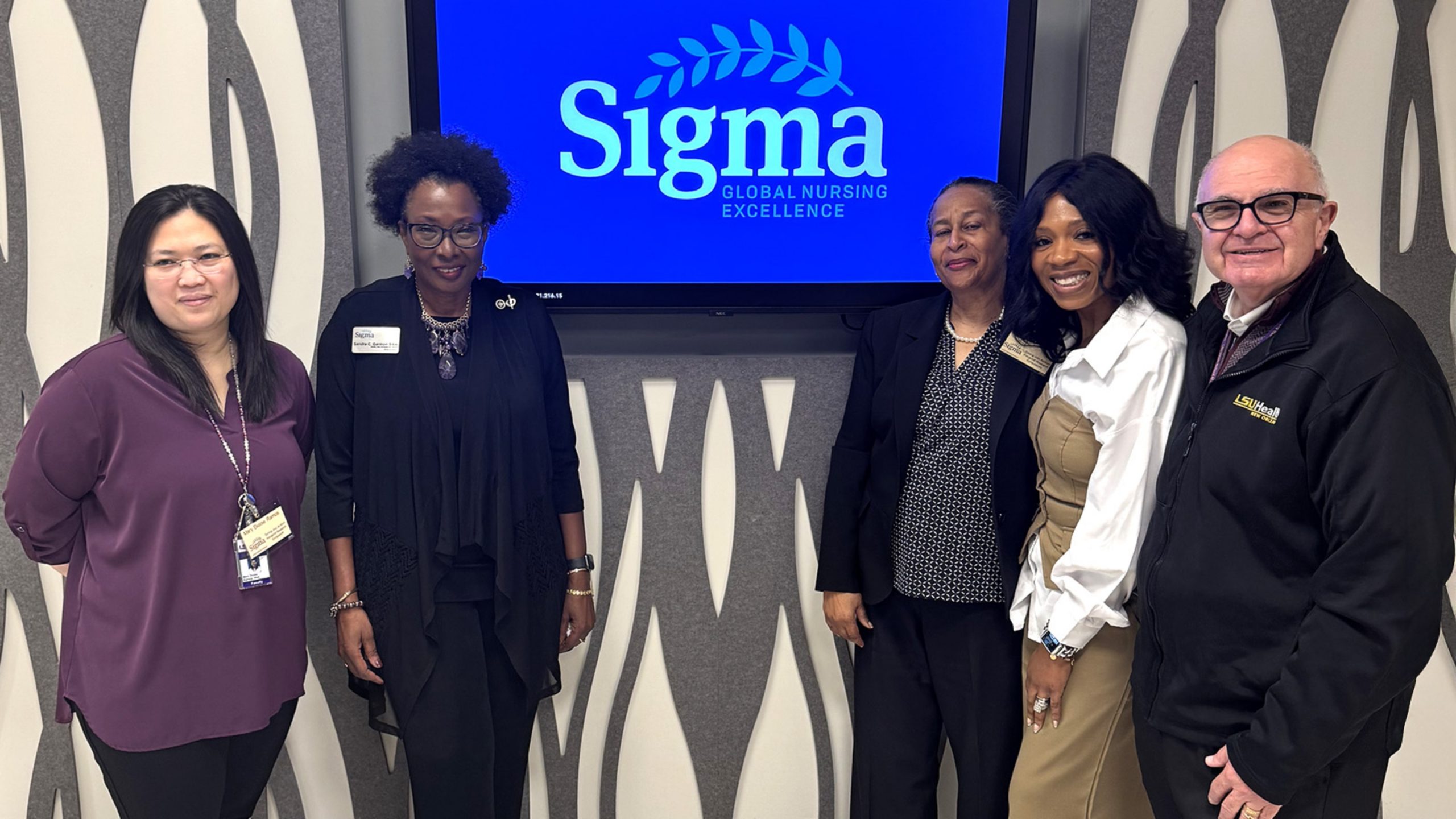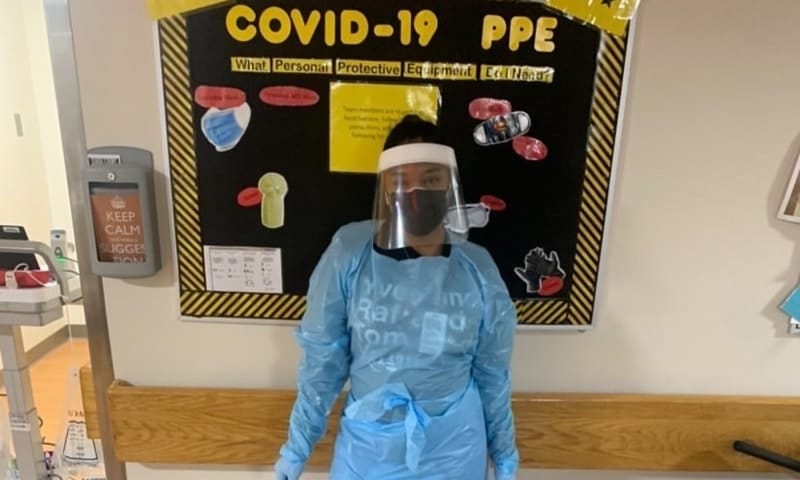At the LSU Health Sciences Center New Orleans School of Nursing, leadership isn’t just taught: It’s inspired, nurtured and lived. Across the region and beyond, alumni of the school are guiding nursing education into a bold future. Among them are three extraordinary leaders whose journeys began at LSUHSC-NO and whose impact now extends to thousands of students and millions of patients: Sandra C. Brown, DNS, APRN, FNP-BC, CNE, ANEF, FAANP, FAAN, Dean of Southern University’s College of Nursing and Allied Health in Baton Rouge, Louisiana; Ann Carruth, DNS, RN, Dean of the College of Nursing and Health Sciences at Southeastern Louisiana University; and Julie Tanner Sanford, DNS, RN, FAAN, ANEF, the Angelyn Adams Giambalvo Dean of the University of Alabama Capstone College of Nursing in Tuscaloosa.
Though their paths and passions differ, each of these leaders found purpose, confidence and direction at the School of Nursing. Their stories reflect not only personal transformation, but also the school’s resolute dedication to preparing nurse leaders who shape the future of health care.
A Lifelong Calling Sparked by a Penchant for Precepting and a Hallway Conversation
For Dr. Brown, leadership began with a love of teaching. After earning her Bachelor of Science in Nursing at the University of Southwestern Louisiana (now the University of Louisiana at Lafayette), she began work as a Med/Surg and an ICU nurse.
“All of the aspects of critical care intrigued me, and it was fast-paced,” she says. “I became a preceptor, teaching new nurses about critical care, and I was told I was good at breaking down complex topics so student nurses and new nurses could learn. In that role, my thirst for teaching grew, and I knew I needed a master’s degree to start.”
Dr. Brown entered LSUHSC-NO to pursue that master’s degree with plans to enter the classroom. Then came a pivotal moment: a hallway conversation with then Dean Dr. Marie DiVincenti. “She asked if I’d ever thought about getting my doctorate and shared that the school had just launched a DNS program,” Dr. Brown says. “That sparked something in me and led me down a pathway that changed my life.”
She hadn’t initially understood how deeply transformative the experience would be.
“If you can’t serve, you can’t lead. Our students watch us closely, and that’s a responsibility I take very seriously.”
– Sandra C. Brown, DNS, APRN, FNP-BC, CNE, ANEF, FAANP, FAAN, Dean of Southern University’s College of Nursing and Allied Health
“Everyone said, ‘Sandra, you need your terminal degree.’ People there were kind and helpful, and their flexibility made all the difference,” she says.
Encouraged by nurturing faculty and supportive classmates – especially current Dean Demetrius Porche, DNS, PhD, ANEF, FACHE, FAANP, FAAN, who studied alongside her – Dr. Brown grew into her identity as a nurse scholar and leader.
“We studied together, exchanged ideas. It was never competitive, always collaborative,” she says. “We were all in it together, trying to achieve something important.”
Dr. Brown was the first African American to graduate from the School of Nursing’s DNS program, but she says she never felt excluded.
“The faculty and students created an environment that embraced learning and diversity. We were all on the same path, trying to learn and grow. That foundation allowed me to step into leadership knowing I belonged,” she says.
Her postdoctoral work brought her to Pennington Biomedical Research Center, where she volunteered her time to gain hands-on research experience.
“I told them, ‘You don’t have to pay me. The experience is the reward.’ I wanted to be around people doing the kind of research that mattered to me,” she says.
Over her more than 30 years at Southern University, she has taught, mentored and led with intention and care, always grounded in her roots.
“I think what I do is a calling,” she says. “I was the first in my family to go to college. My parents were blue-collar workers who instilled the importance of education. When I graduated, my entire small-town community in Lafayette celebrated. I’ve carried them with me every step of the way.”
Today, Dr. Brown’s legacy is reflected in the students she mentors, many of whom are the first in their families to attend college.
“I want them to see what they can become,” she says. “When students leave my classroom or graduate from this school, I want them to feel whole, fulfilled and inspired. If you can’t serve, you can’t lead. Our students watch us closely, and that’s a responsibility I take very seriously.”
A Researcher Drawn to Leadership by Preparedness and Purpose
For Dr. Carruth, an early academic challenge sparked a passion for scientific inquiry.
“During my master’s program, a nurse scientist asked, ‘Do we know if cataract surgery improves quality of life?’ That question opened my eyes to the importance of research that truly reflects nursing’s impact,” she says. “I realized I wanted to study outcomes that mattered to patients and to nursing.”
Dr. Carruth’s career has been shaped by a series of mentors who recognized her gifts and guided her forward. “The dean who hired me at Southeastern had taught me undergraduate research,” Dr. Carruth says. “When I told her I was considering a doctorate, she said, ‘Go to the best university you can, and go as far as you can.’ That’s how I ended up at the LSU Health Sciences Center New Orleans School of Nursing.”
She hadn’t envisioned academic leadership at the outset, as her mind and heart were set on research. But the rigor of the School of Nursing’s curriculum gave her skills that proved invaluable.
“I wanted to be a nurse researcher, and the School of Nursing prepared me to be just that,” Dr. Carruth says. “Because of my success in grant writing and publishing, I was successful at achieving tenure. These skills were transferable to the graduate nursing coordinator position. In this position, there were many leadership opportunities, which eventually led to me being asked to serve as the interim dean.”
Her time at LSUHSC-NO also transformed how she thought and worked.
“Dr. [Patricia] Lane was my dissertation chair. She taught me how to think in layers, how to tackle a complicated problem one step at a time,” Dr. Carruth says. “She showed me the power of persistence, of sitting with a hard problem until it starts to make sense. That shaped my approach to everything I’ve done since.”
As dean, she’s brought that same focus on excellence and reflection to Southeastern.
“We’ve built a faculty culture rooted in student success and workforce readiness,” she says. “We’ve grown, developed new partnerships and seen incredible student outcomes. But what I love most is mentoring others, watching them discover what they’re capable of.”
She encourages her students and colleagues to be thoughtful observers. “Notice the kind of leadership that inspires you, and what doesn’t. Those lessons will serve you when you’re in positions of influence. Leadership isn’t just about titles: It’s about consistency, respect and values.”
From the Classroom to Capitol Hill: A Journey of Service, Mentorship and National Influence
Dr. Sanford enrolled at the LSUHSC-NO School of Nursing as a working nurse and mother of three. “It was intense,” she remembers. “I was juggling work, raising a family and pursuing a doctorate. But I was determined, and the faculty saw that. They didn’t just teach us; they invested in us.”
That investment came in the form of mentoring, encouragement and true collegiality.
“Judith Rocchiccioli, Don Johnson and Demetrius Porche – a young faculty cohort – were my anchors,” she says. “They challenged my thinking and always made time to listen. I remember how we’d gather for lunch or coffee and just talk about ideas, problems, possibilities. That space to think and connect was rare and valuable.”
Dr. Sanford’s research focused on informal caregiving in rural settings, and it laid the groundwork for a lifelong passion for improving access and equity in health care.
She later took on academic leadership roles at James Madison University and the University of Mississippi Medical Center, where she helped stabilize and expand programs, build new facilities and secure critical grant funding. “I’ve always looked for opportunities to serve and grow,” she says. “But I never forgot the foundation the LSU Health Sciences Center New Orleans School of Nursing gave me.”
In 2019, Dr. Sanford testified before the U.S. Senate Committee on Health, Education, Labor & Pensions about the importance of funding nursing education, an experience that brought her full circle.
“I learned about policy at the School of Nursing,” she says. “It was in those early classrooms that I first imagined how nurses could influence health systems on a national level.”
Now, as Chair-Elect of the American Association of Colleges of Nursing Board and Dean of the University of Alabama Capstone College of Nursing, where she earned her BSN, she advocates for the next generation. “We desperately need nurse educators who understand today’s students, who model excellence and empathy, and who never stop learning,” she says.
Her advice to others? “Say yes more often than you say no,” Dr. Sanford says. “The first time I was asked to help put our nursing education program online, I didn’t know what I was doing, but I said yes. That decision changed the trajectory of my career. Also, remember that giving back matters, whether through mentorship, time or financial support. It’s how we carry the mission forward.”
A Legacy That Endures
Through different paths, in different states, and with different leadership styles, Dr. Brown, Dr. Carruth and Dr. Sanford share one common foundation: the LSU Health Sciences Center New Orleans School of Nursing. Here, each alumna found more than knowledge: They found encouragement, clarity, purpose and the call to lead.
Their stories are a testament to the school’s mission: to prepare nurse leaders who shape the future of health care through excellence in education, practice, research and service. Their lives are proof that when nurses are supported, believed in and challenged, they can change the world.







